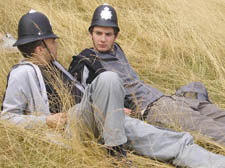|
|
 |
| |

Chadov and Ben Barnes |
Big issues from the diary of criminal
BIGGA THAN BEN
Directed by Suzie Halewood
Certificate 15
GET a copy of Loot. Skim through it and find yourself a horrible, cheap bedsit. Install a phone line. You have no intention of ever paying a bill for it but it’s proof of address. Get yourself a wage slip – do a week’s work if you have to.
Then you are ready to open a current account and can begin writing bad cheques and getting cash back from shops, with no intention, of course, of ever paying it back.
In Bigga Than Ben, we follow the true tale of a pair of Russian immigrants who land in London with dreams of earning the cash they need to take their rock band to sunny California.
Instead, they get mired in the daily grind of finding a roof over their heads in the metropolis and scraping together enough cash to eat regularly – and then tell all about how they manage to live .
It’s grainy, gritty, full of wink-wink asides that Londoners will recognise, and with two able leads in Ben Barnes and Andrei Chadov, you find yourself rooting for our new arrivals.
I caught up with director Suzie Halewood and she defended her portrayal of the immigrants’ lot – they have been described as thieving drug-takers by the press – and how multicultural London considers recent influxes of ethnic groups.
It is a tricky topic and one which attracts its fair share of bigotry, so it was brave for Halewood to approach these difficult issues in such a light-hearted manner.
“People will say this plays on a variety of racial stereotypes,” says Halewood. “But that is only a problem if the viewer can’t see beyond that – there are stereotypes in the film, but ones the characters had when they first came from Russia, and stereotypes the viewers will hopefully understand and dismiss.”
The film is based on the real diaries of Pavel Tetersky and Sergei Sakin. Halewood read their book on how to make a living through petty crime on the streets of the capital and realised the story would make a great film.
She first heard of the diary after reading an inflammatory article in a right-wing newspaper saying the diary was a “foreign crook’s guide” to milking born and bred Londoners of their hard-earned cash.
“I was galled by the diary at first – the tone of the article was how these good-for-nothings come over here and spend their time ripping off the whole country,” she admits.
This was not the case.
“I found it, read it and realised it is essentially the story of how difficult it can be to survive in London, for people to make a living here.
“To start with the authors denied they had written it,” she says. “They were living back in Moscow by then. They were embarrassed about it and were fearful they’d get in trouble. One of them refused to meet me, the other said they’d only let me make the film if I got Brad Pitt to play them.”
Once the authorship had been confirmed, the ownership became a problem.
“They had fallen out with the publishers and so I had to give up – no one knew who owned the rights.”
Then, two years later, she was contacted by Peter who told her the issues had been resolved (apparently the publishers had failed to pay the pair their royalties) and the film could go ahead.
“The diary describes seedy parts of our city which you just do not see on screen,” she says.
This includes a memorable moment when London’s drugs trade is mapped out on a Monopoly board – Camden Town is where you buy cannabis, while the crack trade thrives in Kilburn.
Bigga Than Ben feels low budget and relies occasionally on poor taste jokes to make the scenes – for example, a skit about where to use the toilet when living in a garden shed. But as a complete package it’s pretty heartbreaking, as a film about economic migrants should be.
It uses lots of local places and faces: Camden Town pops up regularly, with landmarks such as the Dublin Castle and the Model Shop featuring.
Morrisons in Chalk Farm also appears, as does the Chalcots estate in Adelaide Road. The director includes shots of South End Green, with flower-seller John Atkins given a walk-on part, and an Irish down and out called John also has a brief speaking part.
Bigga Than Ben is far from polished, but it tells an important story and gives a voice to a silent section of Londoners who have come to make this city their home. |
 |
|
 |
| |
|
 |
|

